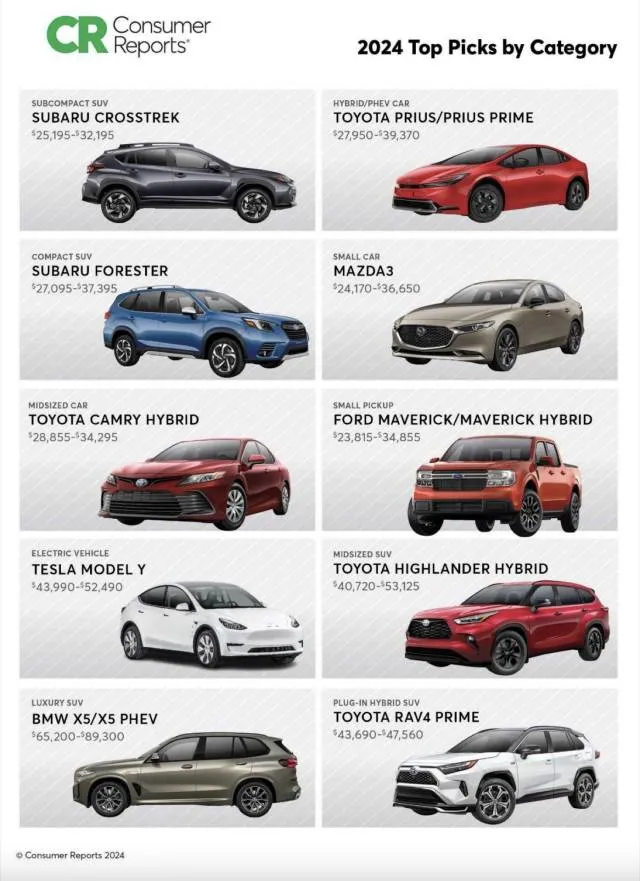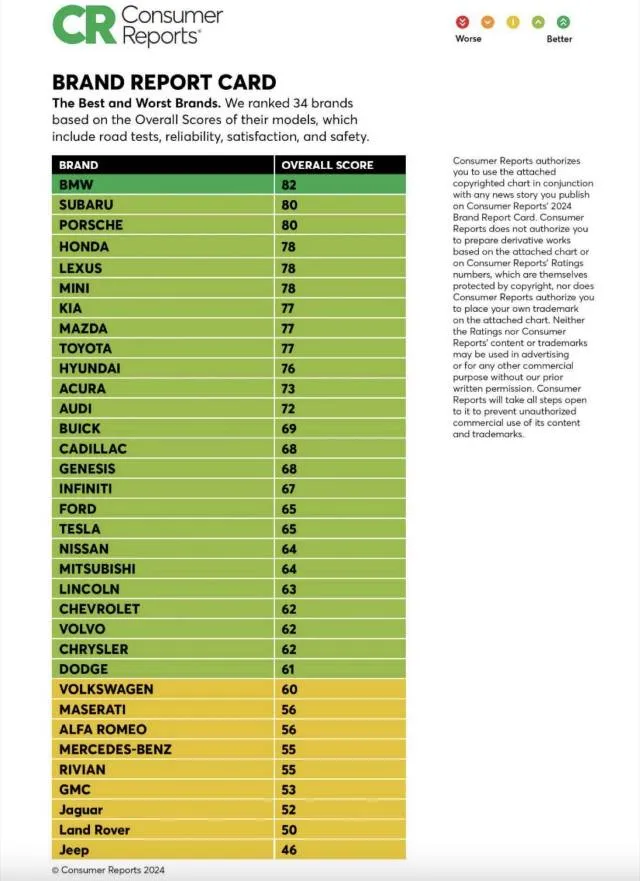Electrified vehicles made big gains in sales in 2023, and they also dominate Consumer Reports’ annual 10 Top Picks of 2024, the nonprofit consumer advocacy group announced Tuesday.
“Consumer Reports’ new Top Picks list demonstrates that models with fully or partially electrified powertrains can surpass the overall performance of their conventional counterparts: Among the standouts this year are one EV, three PHEVs, and three hybrids,” said Alex Knizek, manager of automotive testing and insights for Consumer Reports.
Four of the top 10 recommended vehicles were made by Toyota, thanks in part to its experience over the past 25 years in developing hybrids such as the Toyota Prius and plug-in hybrids such as the Toyota RAV4 Prime and Prius Prime. The Toyota Highlander Hybrid three-row SUV and Toyota Camry Hybrid sedan also made the top 10 out of more than 200 vehicles tested.
Top 10 recommended cars for 2024

2024 Consumer Reports top 10 picks
The CR scores are based on road-test assessments, predicted reliability and owner satisfaction data, safety, and overall value.
“There are lots of good choices at various price ranges so you don’t need to spend a lot of money to get a good car,” Jake Fisher, CR’s senior director of auto testing, said in a press briefing.
Six of the 10 recommended cars cost well below the average transaction price of about $48,000, Consumer Reports was keen to note.
The Tesla Model Y electric crossover scored a comparatively low 73 but it was high enough to be the top recommended EV, usurping the top spot from the related Model 3 electric sedan. “The reliability has increased enough to be applicable on our list,” Knizek said, referencing some initial quality problems that appear to have been ironed out for the bestselling EV. CR noted that the Model Y is “highly efficient, has a good range, excels in a lot of the EV tests, and the Supercharger network is huge advantage for the Model Y.”
The Ford Maverick and Maverick Hybrid (78 score) repeats from last year as an “excellent small pickup truck,” Knizek said, taking advantage of its car platform and good ride quality without compromising the utility of a bed, making it ideal if you don’t plan on off-roading. “It’s civilized and well-mannered otherwise for a truck,” Knizek said. Both the combustion and hybrid Maverick cost below $30,000.
A newcomer to the list and one of only three gas-only recommendations, the Mazda 3 (78) earns the top Small Car rating because it “gets great fuel economy for a non-hybrid, and Mazda punches above its weight in premium feel and performance for under $30,000,” Knizek explained.
Value and a 51-mpg rating also benefits the Toyota Prius (80) as well as the Prius Prime (76) plug-in hybrid with its 39 miles of EV range. It’s no surprise the Toyota twins are the top Hybrid/PHEV car for 2024.
The Toyota Highlander Hybrid (85) and its 35 mpg with AWD also rated high on this year’s list, displacing the Kia Telluride to take the midsize SUV crown this year.
Two Subarus ranked high as well, as the only other gas-only cars to make the top 10. New to the list, the redesigned Subaru Crosstrek (87) won the Subcompact SUV segment due to its reliability and standard EyeSight driver-assistance system. “It has an excellent ride quality that goes beyond its cost and competitors,” Knizek explained, noting its efficiency for being a non-hybrid crossover with standard all-wheel drive.
The Subaru Forester (88) returned for the 11th time in a row on CR’s list. The Compact SUV winner is a “practical choice and gets great fuel economy for a non-hybrid, AWD crossover SUV.”
The Toyota RAV4 Prime (89) topped the plug-in hybrid crossover SUV segment due to its 42-mile range and 34 mpg average. “Compared to the base RAV4 Hybrid, it’s a more premium feel with improved performance,” Knizek noted.
The BMW X5 (92) and X5 PHEV (88) with its 39-mile EV range was the top pick in the Luxury SUV category.
The highest rated car was the Toyota Camry Hybrid (93), winning the shrinking midsize sedan segment before it arrives as a redesigned 2025 Camry model with a standard hybrid powertrain. The repeat winner gets 47 mpg, and has “well-rounded performance, solid reliability, and very high owner satisfaction,” Knizek said.
The plug-in hybrid boost
While many of the models carried over as Top 10 picks for Consumer Reports, the rise of plug-in hybrids as a bridge from internal combustion to electric vehicles caused CR to rework how it rates the complicated powertrain, as well as how it displays information to consumers on its website. Even though the first plug-in hybrid arrived in 2010 with the Chevrolet Volt, there is still a lack of education or miseducation in the marketplace on the nature of the blended powertrain, which enable electric power around town for tailpipe emission-free driving yet long distance road-tripping as in a gas car without ever needing to stop and charge.
“Figuring out if a PHEV is right for you will probably take a bit more research up front,” Fisher said in a statement. “But for many drivers,
PHEVs will save you money over the long run when compared with a gas, hybrid, or electric vehicle.”
It appears consumers are starting to take note, as are automakers such as GM and Mercedes, who recently backtracked from diving into full electric portfolios in favor of a blend of plug-in options, including the plug-in hybrid.
In terms of powertrain type, the biggest growth from 2022 to 2023 was in the plug-in hybrid segment, according to Consumer Reports. Sales of PHEVs grew 60% from 2022 to 2023, while Hybrid (HEV) powertrains grew 53%, and full battery electric vehicles (BEV) grew 47%. Vehicles with internal combustion engines grew 7%, which relative to overall sales is actually a relative decrease.
Overall new car sales grew 13.2% from 2022 to 15,466,000 units in 2023, according to J.D. Power estimates.
The lack of education also comes with an unknown in terms of long-term reliability of complex PHEV powertrains, that combined both a gas engine and an electric propulsion system. Fisher and Knizek both advocated for selecting reliable brands when considering a PHEV.
“Toyota has demonstrated making PHEVs reliable in the long term, by harnessing 25 years of HEV development,” Fisher said. “Many PHEVs have reliability problems, but so do those brands, Stellantis and VW. Bc EVs have more relaibility problems, it pays dvidienvd to choose one of the more reliable models from one of the more reliable brands.”
Brand report card, not about price
BMW (82) and Subaru (80) top the brand report card Porsche (80)
Cadillac (68) and Ford (65) made impressive gains of 11 and 6 respectively. They drive very well but the reliability has held them back espeafter launching new platforms. They’ve worked that out. GM and Ford are standouts in semiautonomous driving systems, outperforming Tesla’s autopilot segment.
Subaru is the most impressive sandwiched between two german high end brands. Holds its own with very good reliable cars, but their vehicles are quite mature and drive very nicely.
Porsche (80)
Bottom five of 34 brands assessed: Rivian 55 GMC 53 Jaguar 52 Land Rover 50 Jeep 46 most cases the reliability isn’t there in a lot of these vehicles as not great choices.
“It’s a big opportunity for all of us to explain what PHEVs are. Early missteps are making it hard.” There are some bright spots.
From the testing side that we’ve learned over time, not all PHEVs are created equally. The ways of implementing PHEVs are so vast that it comes down to the education piece about what you can expect.” Alex Knizek

2024 Consumer Reports Brand Report Card
